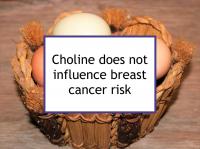A new study has reported that choline and betaine intake is not linked to breast cancer risk in postmenopausal women. Choline is a compound similar to folate and is normally classified with B vitamins and betaine is a biologically active metabolite of choline. Choline is found in foods such as egg yolks, soybeans, cauliflower, dry beans and lecithin.
Betaine is found in spinach, beets and whole wheat. The study included 74,584 postmenopausal women in the Nurses' Health Study. A food questionnaire was used to assess nutrient intake six times starting in 1984. The average choline intake among the participants was found to be 326 mg per day, which was below the 425 mg minimum considered adequate for women (however, the recommended daily allowance (RDA) has not been established). The average daily betaine intake was 104 mg. The women were followed for 20 years (1984-2004), during which time 3,990 new cases of invasive breast cancer were found among them.
Choline and betaine were not found to be associated with risk of postmenopausal breast cancer. Study participants in the highest fifths of choline and betaine consumption had the same risk of breast cancer as those in the lowest fifths of intake. The results did not vary significantly when analyzed according to hormone receptor status (ER/PR) status. Nor were they changed when adjusted by known breast cancer risk factors such as level of alcohol consumption, a family history of breast cancer, a history of benign breast disease, body mass index, use of hormone replacement therapy (HRT), or folate intake. The authors conclude that they found no evidence that higher intakes of choline and betaine reduce risk of breast cancer among postmenopausal women.
Previous studies have reported conflicting results
As is also the case for folate, attempts to measure a clear association between choline, betaine and breast cancer have produced mixed results. The present study and a previous large prospective study based on premenopausal women in the Nurses' Health Study found no overall associations between consumption of choline and betaine and risk of breast cancer.
However, a 2009 case-control study based on the Long Island Breast Cancer Study Project found that higher intakes of choline and betaine were associated with lower breast cancer mortality in a dose-dependent manner. The authors identified a betaine-related gene variant that conferred decreased breast cancer-specific mortality among carriers.
A carefully controlled rat study found that choline-supplemented rats produced offspring with a favorable genetic profile with respect to mammary tumorigenesis. The offspring overexpressed six genes that are known to confer favorable prognosis in human cancers and underexpressed 10 genes associated with aggressive cancer. The same study found that while choline supplementation of the mothers did not reduce the incidence of mammary tumors in the rat offspring, it reduced the tumor growth rate and improved survival. It may be that childhood is the most important period for adequate choline consumption with respect to breast cancer risk.
